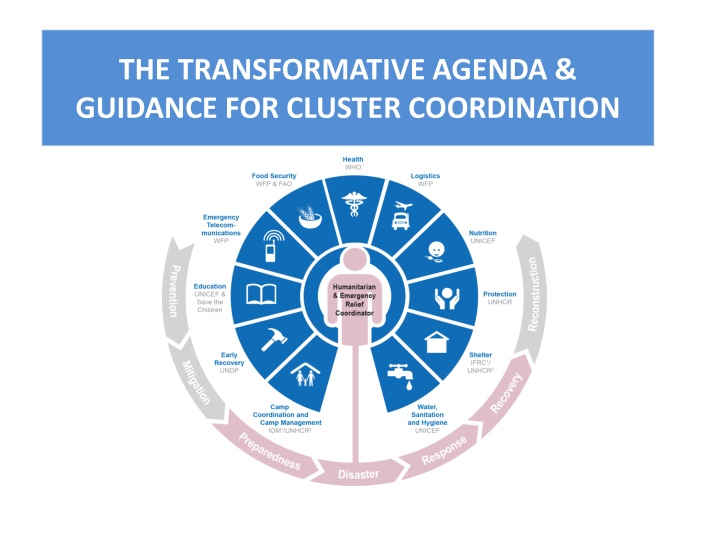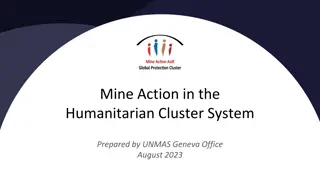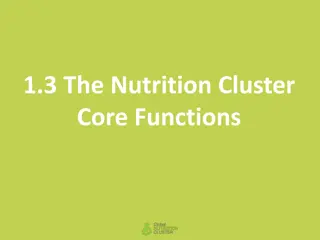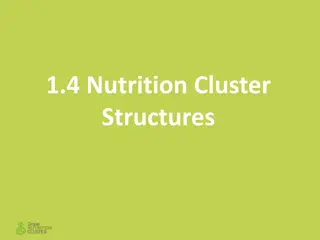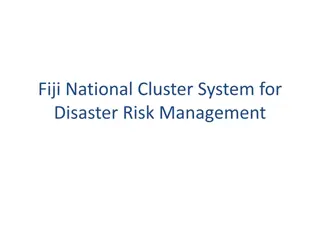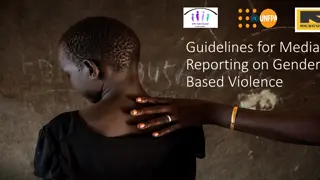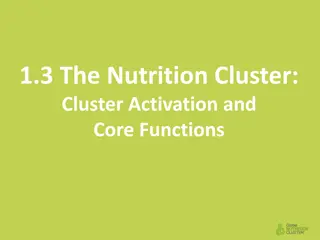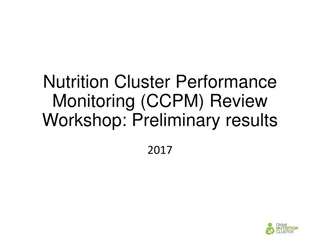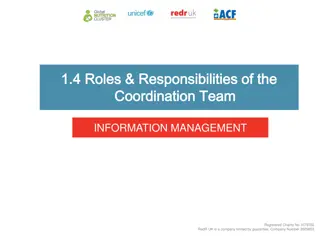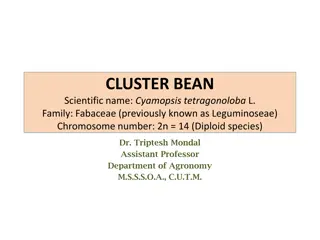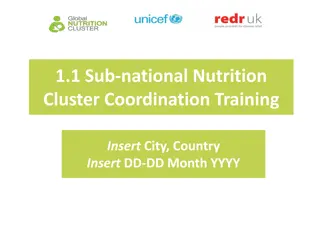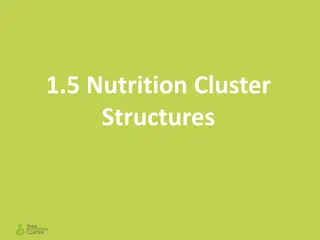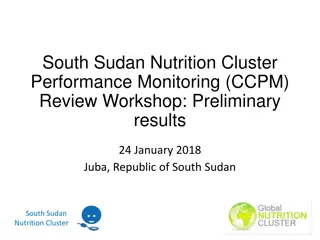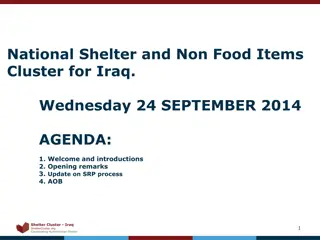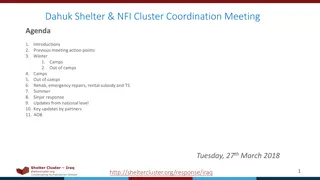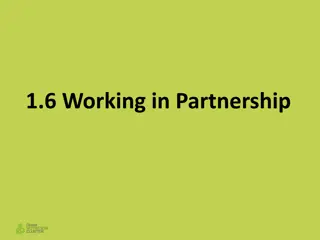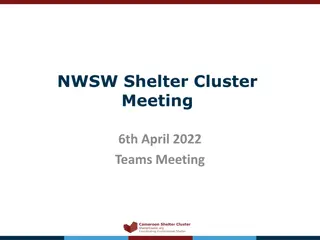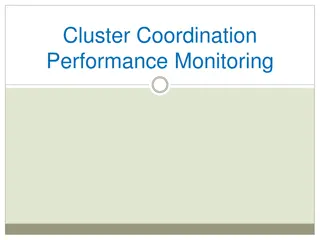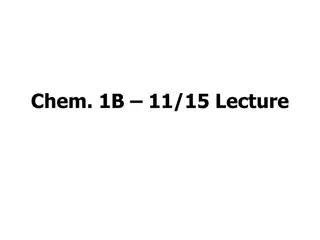Transformative Agenda and Guidance for Effective Cluster Coordination
Explore the transformative agenda and guidance for cluster coordination, emphasizing the roles of UNICEF as a cluster lead agency, core cluster functions, inter-cluster coordination, and management strategies for effective humanitarian response. Key focus areas include accountability, human financing, preparedness, resilience, revitalizing humanitarian action principles, and protection priorities. The cluster approach ensures a well-coordinated, strategic, coherent, and effective response to emergencies, with UNICEF taking a lead role in specified clusters.
Download Presentation

Please find below an Image/Link to download the presentation.
The content on the website is provided AS IS for your information and personal use only. It may not be sold, licensed, or shared on other websites without obtaining consent from the author.If you encounter any issues during the download, it is possible that the publisher has removed the file from their server.
You are allowed to download the files provided on this website for personal or commercial use, subject to the condition that they are used lawfully. All files are the property of their respective owners.
The content on the website is provided AS IS for your information and personal use only. It may not be sold, licensed, or shared on other websites without obtaining consent from the author.
E N D
Presentation Transcript
THE TRANSFORMATIVE AGENDA & GUIDANCE FOR CLUSTER COORDINATION
AGENDA IASC Structure Transformative Agenda Cluster Approach UNICEF as Cluster Lead Agency Cluster Coordination: Guidance for UNICEF Country Offices Responsibility of Country Representatives Responsibility of the UNICEF Country Office Management of Clusters Accountability Accountability to affected populations
IASC PRIORITIES FOR 2014-2015 Accountability to Affected Populations Humanitarian Financing Preparedness and Resilience Revitalizing Principles of Humanitarian Action Protection Priority: Global Protection Cluster
THE CLUSTER APPROACH The purpose of Clusters and Areas of Responsibility (AoRs) is to ensure a well coordinated, strategic, adequate, coherent and effective humanitarian response. Activation Activated Deactivated
UNICEF AS A CLUSTER LEAD AGENCY (CLA) Tasks of the Cluster Lead Agencies (CLAs) clarifying the roles, responsibilities and accountability of UN and non-UN partners responding to specific emergencies streamlining communication with the host government in accordance with the IASC guidelines, accountable to the Humanitarian Coordinator and Provider of Last Resort (PoLR) UNICEF is the Global Lead Agency for 3 Clusters and 2 AoRs:
6 CORE CLUSTER FUNCTIONS SUPPORTING SERVICE DELIVERY 1 INFORMING STRATEGIC DECISION MAKING OF THE HC/HCT 2 PLANNING AND STRATEGY DEVELOPMENT 3 ADVOCACY 4 MONITORING AND REPORTING 5. CONTINGENCY PLANNING/PREPAREDNESS/CAPACITY BUILDING 6
ACCOUNTABILITY CLAs are responsible and accountable to a range of actors, including the: affected populations by providing them with timely and appropriate assistance; HC for building up and ensuring a more predictable and effective response capacity; national and local authorities to build capacity, prepare and coordinate a response; donors for a cost-effective and efficient use of funds received; and cluster members for a well-structured and managed coordination mechanism.
COMMITMENTS TO ACCOUNTABILITY TO AFFECTED POPULATION (AAP) There is a need for a more coordinated setting of priorities between key stakeholders and regular communication with affected populations throughout an emergency response. Leadership/Governance Transparency Feedback and Complaints Participation Design, Monitoring and Evaluation
WHAT DOES THIS MEAN FOR UNICEF? Humanitarian Leadership Coordination Quality and accountability
GUIDANCE FOR UNICEF COUNTRY OFFICES Guidance Document (2015) Part One: The cluster approach how it works and UNICEF country representative responsibilities. Part Two: The cluster approach UNICEF country office responsibilities
Responsibility of UNICEF Country Representative The UNICEF Country Representative is ultimately accountable to the Humanitarian Coordinator for the effective functioning of the Cluster(s). The Country Representative has responsibility to enable cluster(s) through: i) timely appointment of adequate number of experienced staff ii) availability /accessibility of adequate administrative, logistical and office services to clusters iii) ensuring funding is available for coordination functions iv) ensuring effective management of cluster staff v) representation of and advocacy on behalf of cluster(s) The UNICEF Country Representative should: Engage in HCT business and decision making in all phases of the emergency response Represent both the interests of UNICEF as an Organization and the interests of the 5 Clusters/AoRs it leads Differentiate when speaking on behalf of UNICEF or clusters Be knowledgeable about cluster issues: activities, progress, plans
Responsibility of the UNICEF Country Office HR Mobilisation: secure funding for and recruit Cluster and AoR Coordinators and IM specialists develop a strategy for staffing for clusters and AORs based on analysis of the coordination capacity and need UNICEF programmes working with Clusters: Strong functional clusters will strengthen UNICEF emergency programme. Programme sections should work with, support and strengthen the respective clusters: The Chief of Section(s) represents UNICEF in the Cluster(s) as member of a Strategic Advisory Group (SAG) and/or act as OiC for the Cluster when the Cluster Coordinator is not in the duty station Technical staff members should also actively participate in Cluster Meetings and Technical Working Groups (TWGs)
Recommendations in the Guidance Document The Cluster Coordination Guidance further contains useful recommendation for the various aspects of working with the Clusters and AoRs: UNICEF in-line management of Cluster and AoR coordination UNICEF-led Cluster Management meetings UNICEF attendance/representation in Cluster and AoR relevant meetings (Coordination Meetings, HCT Meetings, emergency management team conference calls) Monitoring of Cluster performance and functioning Planning and budgeting for Cluster activities Operational support
Management of Cluster within UNICEF Neutrality of Cluster Coordinators Cluster and AoR coordinators have an overriding duty to the partners and should act as neutral representatives of the cluster as a whole rather than as representatives of UNICEF. Double Hatting Operational and administrative support It is essential that space is created to allow cluster related issues to be adequately discussed and addressed within UNICEF, to ultimately enhance UNICEF support of cluster coordination. It is the responsibility of the Country Representative to ensure that the various sections of the organization prioritize provision of operational and administrative support services for effective coordination.
QUESTIONS Further information: Global Cluster Coordination Unit (GCCU), EMOPS Geneva Cluster Coordination: Guidance for Country Offices on INTRANEThttps://intranet.unicef.org/emops/EMOPSSite.nsf/root/Page0201 (Guidance and Tools)
